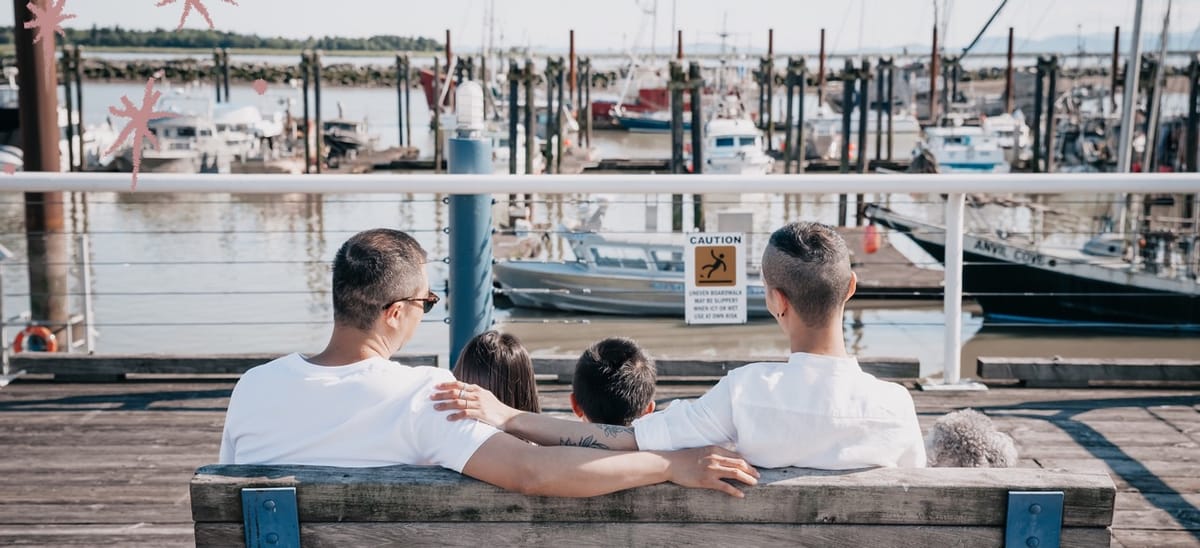On National Adoption Week, I Want to Celebrate Same-Sex Parented Families in the UK - Starting with My Own
As someone who has adopted, I have high hopes for the Government's new national adoption strategy, and what it means for LGBTQIA+ families.

Access the Audio Read version of this article directly on Spotify for Podcasters.
"It is important to remember our past, and our LGBTQIA+ brothers and sisters who fought and struggled so that we could enjoy the protection and relative ease of being a queer family today."
In July 2021, the Government announced its new national adoption strategy. According to the policy paper, it will be backed by £48m extra funding in adoption services in order to cut delays through better training, improvements to the approval process, and funding for targeted recruitment campaigns. The strategy aims to cut waiting times and confirms that adopters should never be put off from pursuing an opportunity to adopt because of their social background, ethnicity, sexuality, or age.
Money has also been allocated to boost post-adoption help for families, to provide family support sessions, cognitive therapy, and activities aimed at helping children recover from earlier traumas and settle into their new homes.
As someone who has adopted, I have high hopes for this new strategy, but many are sceptical that £48m is not enough to reform a service that for too long has been underfunded. According to the Local Government Association, almost 80,000 children were in care in the UK last year (a ten year high), resulting in record waiting times for children to be adopted.
For the LGBTQIA+ community, adoption is one of the main ways to have children. Figures published by the Government’s Department for Education in 2020 showed that one in six adoptions in 2020 were to same-sex couples. Indeed, out of the 3,440 adoptions in England last year, 570 were to same-sex couples. This is the highest number of adoptions by same-sex couples to date, beating the previous high of 490 in 2019.
This number does not include bisexual or trans people unless they are in a same-sex relationship, nor does it take into consideration the sexual orientation and gender identity of single adopters - meaning these numbers are likely to be much higher than reported.
But we’ve come a long way from the 1970s. In her book Modern Families: Parents and Children in New Family Forms, Professor Susan Golombok recalls how lesbian parents in the 70s, 80s, and 90s, had their children taken from them after divorce proceedings when they separated from a male partner to be with a woman. Courts at that time believed it was detrimental for children to be brought up by gay parents. In one case, she talks about how the courts ruled it would be better for a child to live with his father – a convicted murderer – than with his mother, who was in a happy and loving relationship with a woman. It is important to remember our past, and our LGBTQIA+ brothers and sisters who fought and struggled so that we could enjoy the protection and relative ease of being a queer family today.
Adopting comes with many challenges and doubts. There can often be a deep-rooted shame that weighs the LGBTQIA+ community down. The question “am I pushing my own gay “agenda” on my children?” can be a constant concern, but at the end of the day, I asked myself: who cares? Our fear of what other people think should not control our parenting and hold us back from allowing our children to express themselves the way that they should.
Personally, I didn’t want to enable a vicious circle of shame, so I came to my (queer) senses. It takes guts to apply to adopt children, knowing that your life is about to be closely scrutinised. My partner and I had no idea what we were doing when we first had the ‘why don’t we adopt’ conversation three years ago, but we welcomed the process. We were given the freedom to explore our options and took it at our pace. We knew we were doing the right thing, and for those that do weather the adoption journey, the level of dedication required comes from one overriding wish: to give children love and a good experience of care.
The reality is that the parent I thought I was going to be and the parent I ended up being are very different. Some might say that their children were ‘meant to be’ in their family, or ‘better off,’ but I have come to appreciate the difficult walks of our sons’ birth parents. I don’t know their pain first hand, but their loss is part of our family story.
Right now, our boys are too little to grasp the loss that predates their entry into our family, but one day soon, they’ll ask the hard questions. Our boys bring us happiness and a sense of fulfilment which we never imagined, but their stories begin with loss and I’ve learned to respect that. But love is love, and if it is what you want, maybe the time is now to take the plunge to parenthood.





